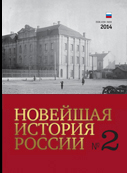АНРИ ГИЛЬБО И ВЛАДИМИР МАЯКОВСКИЙ: «БОЛЬШЕВИК ИСКУССТВА» ГЛАЗАМИ ФРАНЦУЗСКОГО ЛЕВОГО ПОЭТА
Henri Guilbeaux and Vladimir Mayakovsky: "Bolshevik of Art" as seen by the French left-wing poet
Author(s): L. V. Slutskaya Subject(s): Cultural history
Published by: Издательство Исторического факультета СПбГУ
Keywords: MAYAKOVSKY; GUILBEAUX; POETRY; LITERATURE; FUTURISM; SOVIET ART; REVOLUTION; BOLSHEVISM; USSR; FRANCE
Summary/Abstract: The paper presents a view of the life and career of the prominent Soviet poet Vladimir Mayakovsky by the French left-wing poet, essayist, social and political figure Henry Guilbeaux. Guilbeaux was a politician, a journalist, a rollandist writer, and the head of the “dynamism” movement, a poetic movement similar to futurism. Being the author of Lenin’s first biography written during the life of the Bolshevik leader, in scientific circles Guilbeaux was known better as a French anarcho-syndicalist, a socialist, a communist, a pacifist, a correspondent of “L'Humanité "and the founder of “Demain” magazine. In France he was sentenced in absentia to death for his anti- war and revolutionary propaganda. Having arrived in Soviet Russia in 1919 for the founding congress of the Comintern, Guilbeaux found himself at the center of political life as well as in the creative intelligentsia circles of Petrograd and Moscow. He lived in the USSR until July 1922, where he joined the Union of science, art and literature workers and personally knew many representatives of Soviet culture and art - F. Chaliapin, Vs. Meyerhold, V. Mayakovsky, M. Gorky, S. Yesenin, M. Voloshin, I. Ehrenburg etc. In this article the author analyzes Guilbeaux’s work,preserved in the Russian State Archive of Literature and Art, and which has never been published in Russian. This work is dedicated to Mayakovsky, whom the Frenchman valued particularly highly. He called the Soviet poet “modern, revolutionary and the greatest poet of the USSR”, “Bolshevik of art”, “fiery lyricist and satirist”. Trying to understand the real causes of Mayakovsky’s suicide Guilbeaux drew attention to the struggle waged against him behind the scenes and noted that the poet had a lot of enemies and opponents calling into question his talent and innovation. The Frenchman concluded that Mayakovsky was the victim of revolution fast-livers and that the woman affair was only a drop in the overflowing cup. The Death of the “Bolshevik of art” had a huge impact on Guilbeaux, it added political acuity to his views and became the turning point in his perception and understanding of the processes occurring in the late 1920s - '30s in the USSR. From that time Guilbeaux became a fierce opponent of the Soviet regime.
Journal: Новейшая история России
- Issue Year: 4/2014
- Issue No: 10
- Page Range: 106-116
- Page Count: 11
- Language: Russian

